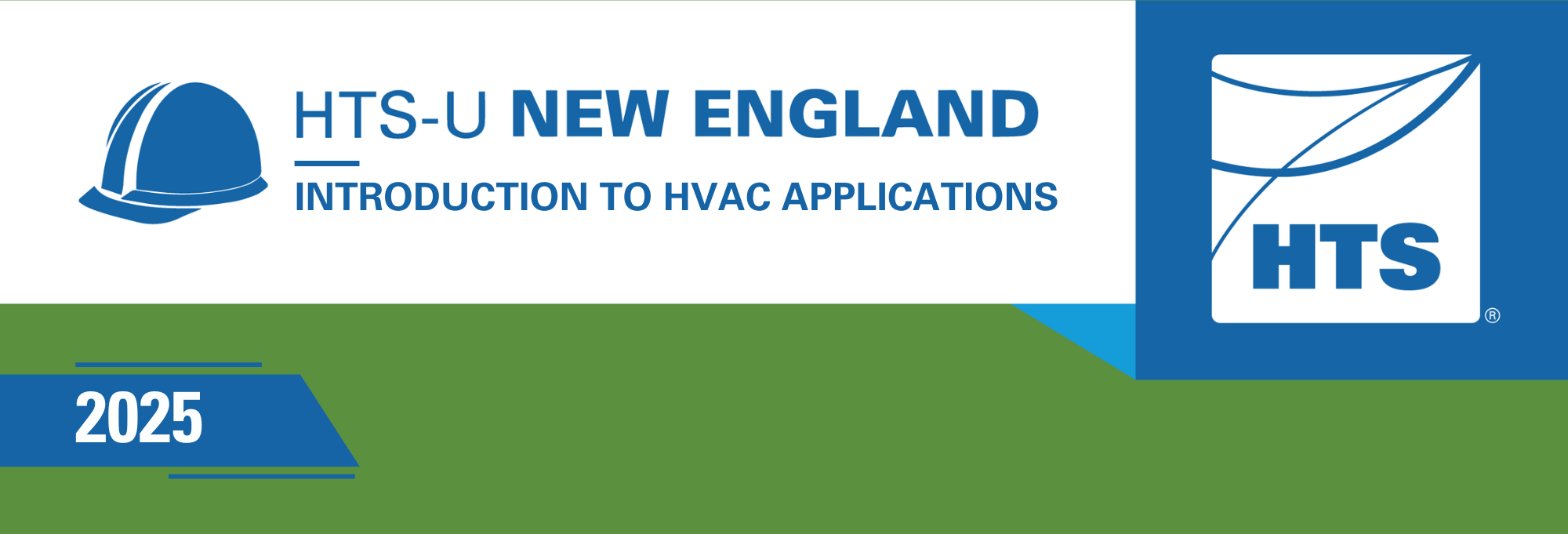
HTS-U | 2025
HTS-U is a 10-week training program designed to enhance Engineers' fundamental HVAC application skills.
When:
Every Wednesday, beginning on Wednesday, January 8th, 2025, and ending on Wednesday, March 26th, 2025.
Please note that there will be no HTS-U Module on Wednesday, February 12th, and Wednesday, February 26th. The full course schedule can be found below.
All courses will run from 4:00 PM EST to 5:30 PM EST.
Where:
All courses are held via Microsoft Teams. Login information on how to join will be emailed to participants closer to the start date.
Cost:
The $100 cost includes a psychrometric chart & note pad, ducting calculator, and other materials as needed.
(Completion Certificates Provided - 1.5 Learning Hours/Module)
Course Schedule:
Module 1 | Psychrometrics (Wednesday, January 8th): This module will discuss the fundamentals of psychrometrics, including a detailed review of the Psychrometric Chart, with a focus on temperature, humidity, dew point, and other important parameters used every day in the HVAC industry. Students will be shown examples of how psychrometrics can be applied in both constant air volume and variable air volume system applications. Students will be challenged by solving example application problems.
Module 2 | Refrigeration Cycle (Wednesday, January 15th): The focus of this training module is the vapor compression refrigeration cycle and how it is used for comfort cooling and heating. With this module, the student will be able to differentiate between the various refrigeration cycle components within the direct expansion (DX) system. Applications such as hot gas bypass, heat pump mode, and low ambient cooling will be covered.
Module 3 | Fans and Pumps (Wednesday, January 22nd): This module provides an overview of the physical & performance characteristics of pumps and fans. Students will be able to identify the various types, evaluate performance charts, and provide ideal selections to meet sound and performance requirements. The module will expand on flow and pressure principles that affect the distribution systems in which they operate. Students will also learn how to use these fundamentals to assess existing systems in the field.
Module 4 | Ventilation and Indoor Air Quality [IAQ] (Wednesday, January 29th): This training module will focus on how we design a building to maintain a safe and healthy indoor environment. We will cover IAQ technologies and show design guidelines to determine proper ventilation rates for buildings. We will also cover how to maximize indoor air quality and discuss the relationship between IAQ and energy use in a building. Students will be introduced to ventilation codes and standards (ASHRAE 62.1), as well as energy recovery codes and standards (MA Stretch Code, PHI, PHIUS, etc.).
Module 5 | AHU Design and Considerations (Wednesday, February 5th): This module will cover the basics of design and applications for various types of air handling units ranging from cataloged packaged rooftops to fully custom. We will review various options, construction, and components of air handlers, including energy recovery.
Module 6 | VRV and Refrigerants (Wednesday, February 19th): The focus of this training module is to provide a refrigerant update and discuss Variable Refrigerant Flow technology. This module will cover the current refrigerants used, future refrigerants, and the refrigerant phase-down. It will also cover how Variable Refrigerant Flow technology is being applied to more buildings, as well as topics such as controls, low ambient cooling and heating, ASHRAE 15, and best design practices.
Module 7 | Hydronic Systems (Wednesday, March 5th): This module will focus on hydronic piping design including open vs. closed systems, pipe friction calculations, and proper system design practices. In order to get a full understanding of hydronic piping systems, the module will cover various components such as valves, expansion tanks, air separators, pumps, chillers, & heat pumps. The module will also introduce students to condenser water systems and chilled water pumping systems such as constant flow, primary-secondary, and variable primary.
Module 8 | Putting It All Together: Applying HVAC Systems for Low-Carbon Buildings (Wednesday, March 12th): This module will focus on the Decarbonization of Domestic Hot Water Systems, Air & Water Source Heat Pumps in HVAC Systems, and Decarbonization of buildings in different vertical Markets. Students will learn about new and retrofit building designs, equipment options such as modular vs unitary and 2-Pipe vs 4-Pipe, and important design considerations such as defrost, buffer tanks and condensate control. We will consider how to decarbonize buildings in the healthcare, life sciences, Multi-Residential, and Education/Office vertical markets by applying the equipment and systems that have been discussed to date.
Module 9 | Controls Systems 101, Part 1 (Wednesday, March 19th): The purpose of this module is to educate the participants on the different levels of a BAS system (Management, Integration, Field Controller, Field Devices), how they fit together, and the difference between open and closed control systems. It will discuss the operator interface, networking and integration, programming, and programming building blocks as well as the controlled devices (valves, dampers, sensors).
Module 10 | Controls Systems 101, Part 2 (Wednesday, March 26th): This session is a continuation of the Controls 101, Part 1 segment. We will review recommended specification practices and control strategies for common HVAC systems. Additionally, we will provide a brief overview of the future of building automation and smart buildings.